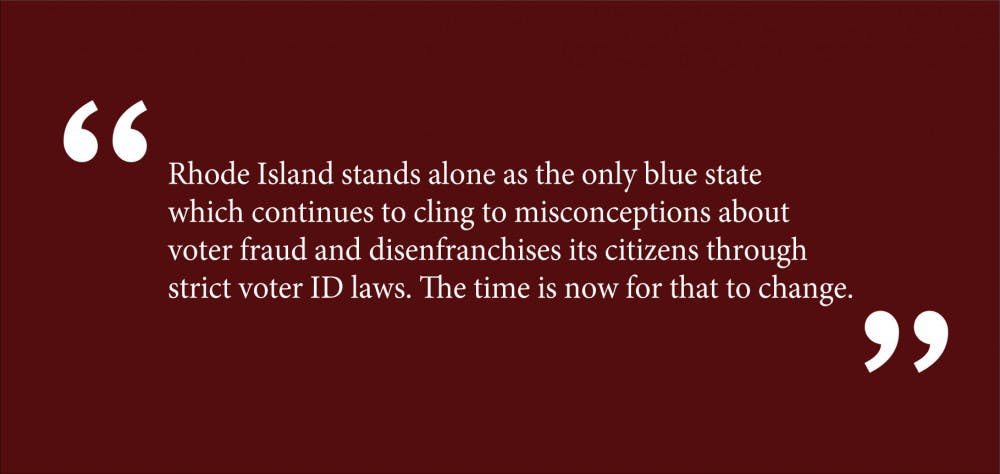Democrats in many states have committed to defending voter rights and increasing turnout as Republicans make efforts to disenfranchise voters. Stacey Abrams, the 2018 Democratic nominee for Governor of Georgia, recently launched Fair Fight, an organization working to build voter protection in states across the country. Several presidential candidates have publicly called for the U.S. to extend the right to vote to convicted felons as well. In 2018, Florida voters passed Amendment Four granting felons immediate voting rights upon the termination of their sentence. Rhode Island stands alone as the only blue state which continues to cling to misconceptions about voter fraud and disenfranchises its citizens through strict voter ID laws. The time is now for that to change. Rhode Island citizens should hold their State Legislators accountable and ensure they vote for S2274, a bill to repeal voter ID laws.
Until 2011, Rhode Island had no voter ID laws on the books. However, in that year, Democratic Senator Harold Metts from Providence sponsored a bill that required voters to present some form of identification starting in 2012 and photo identification starting in 2014. In advocating for the legislation, Metts recounted two anecdotes of voter fraud, and asked “why are some so willing to sacrifice the voter integrity of our system on the altar of fear, while only being concerned about what may potentially happen?” The bill passed 27-6 in the Senate, with 20 Democrats in support. Twelve of those Democrats are still in office, and five of them have strong primary challengers.
Advocates for voter ID laws often argue that without identification requirements our elections are easy targets for voter fraud. However, there is no evidence to support this. The Washington Post conducted a study which found that between 2000 and 2014, when over 1 billion ballots were cast, there were only 31 instances of voter fraud. The Brennan Center similarly estimates that voter fraud happens about .00003% of the time. In response to these overwhelming facts, politicians like Metts have countered with more outlandish fictions, comparing unreported voter fraud to unreported rape.
Rhode Island’s voter ID law has undermined democracy in the state. A study done by the National Bureau of Economic Research found that the photo ID laws implemented in Rhode Island significantly decreased turnout. Some studies estimate the decrease in turnout to be between 2 and 3 percent. In addition, when the law first came into effect in 2014, there were numerous instances where poll workers turned away those without IDs, preventing them from casting ballots. But under Rhode Island law, those without an ID are still allowed to cast a provisional ballot, which counts once a voter’s eligibility has been confirmed. Thus, through poor and incorrect implementation, the law has become even more anti-democratic than the written bill.
Around the country, data shows that voter ID laws disproportionately affect low-income people and minority racial groups. While 8 percent of white people lack a photo ID, that number rises to 25 percent among African-American citizens. Rhode Island offers IDs free of charge, but these IDs are actually far from free in practice. People must still jump through numerous hoops to get an ID, including providing other forms of ID like an employee ID card, an insurance plan card or a credit or debit card. These requirements hurt the numerous low-income people who don’t have access to any of these forms of identification. And even if they do have such a form of ID, it can be financially difficult to go to the DMV or registrar’s office to actually receive the government-issued photo ID, as it requires people to take time off from work, hire a caregiver to watch their kids or pay for transportation.
This kind of active disenfranchisement, particularly of voters of color, has become quite common in red states. In Georgia, then Secretary of State Brian Kemp purged over a million voters from the rolls during the 2018 election season, forcing people to re-register if they wanted to vote. In addition, he closed almost half the polling sites in the state. Kemp, who was running for Governor as he was doing this, is estimated to have prevented 85,000 people from voting in the Georgia election, an election he won by 55,000 votes.
But Rhode Island is not a red state. It has a Democratic governor and Democrats control both houses of the legislature. And yet it has adopted a voter ID law that makes it more difficult to vote. There are 15 states with Democratic trifectas, and Virginia is the only other one with a photo ID law. And the Virginia House voted on Feb. 11 to remove the photo ID requirement, with Governor Ralph Northam saying that he will sign the bill.
In 2015, Senator Gayle Goldin, who represents College Hill, introduced a bill to repeal the law. It died in the Senate Judiciary Committee, even though the Democrats controlled a majority of that committee. Each year since, Goldin has introduced a similar bill, with it gaining no traction in the Senate Judiciary Committee. The 2020 bill, S2274, was released two weeks ago, although no hearing has been scheduled yet. It’s time for something to happen. Democrats must make this passing of the repeal a priority. And the Senate Democrats — both the ones who voted in favor of the original 2011 bill, and those on the Senate Judiciary Committee who continue to block this repeal bill — must be held accountable at the ballot box.
Caleb Apple ’21 can be reached at caleb_apple@brown.edu. Please send responses to this opinion to letters@browndailyherald.com and op-eds to opinions@browndailyherald.com.
Clarification: This article was updated at 1:20 pm on March 2nd to reflect wording changes made in a final round of editing which did not save to the first published version of this op-ed due to a technical error.





